Our 2025 Annual Conference, held in Birmingham, brought together senior leaders from across industry, government, and the wider transport sector to explore the future of high-speed rail, not just as a national infrastructure ambition, but as a practical route to UK growth and productivity.

With the Spending Review on the horizon, the conference came at a pivotal moment, and across a series of panels and keynote discussions, the message was clear: we cannot deliver world-class infrastructure without a world-class delivery plan and a world-class pipeline of people to build it. The conference was opened by HSRG Chair Dyan Perry and expertly Chaired by Broadcaster Sameena Ali-Khan.
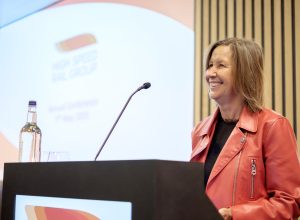
Keynote Address: Andy Burnham on the Northern Arc
Mayor of Greater Manchester Andy Burnham delivered a compelling keynote, emphasising the critical role of infrastructure in driving economic growth. He highlighted that Greater Manchester has achieved an average annual growth rate of 3.1% since 2015, attributing this success to strategic investments and a collaborative approach to development.
Burnham talked to the concept of the “Northern Arc,” which will connect key northern cities to unlock a £90 billion boost to the UK economy by 2040 and stressed that the curtailment of HS2 poses a significant risk to this vision, urging the government to back the Northern Arc to ensure balanced national growth.

Keynote Address: Andy Street on the power of rail investment to achieve prosperity
Former Mayor of the West Midlands, Andy Street, underscored the importance of empowering second- and third-tier cities to achieve national prosperity. He noted that in 2023, Birmingham recorded the highest inward investment of any UK city outside London, demonstrating the potential of regional centres when adequately supported.
Street called for a strategic focus on enhancing the infrastructure and economic capabilities of these urban areas, drawing comparisons to successful European models. He advocated for policies that enable cities like Birmingham to thrive, thereby contributing significantly to the UK’s overall economic health.
Panel session: Delivering HS2 in a Challenging Fiscal Climate
The opening panel tackled the complex task of delivering HS2 and wider high-speed rail ambitions within the realities of a constrained fiscal environment. Speakers shared strategies for ensuring cost efficiency, reliability, and long-term deliverability—including:
- Realistic budget rescoping and a clear-eyed view of the HS2 core network essential to future connectivity.
- Emphasising place-based development to align investment with regional growth needs.
- Adopting international best practices from countries like Spain using the “repeat–learn–build faster” model.
- Passenger-led planning to ensure the service offer leads the infrastructure, not the other way around.

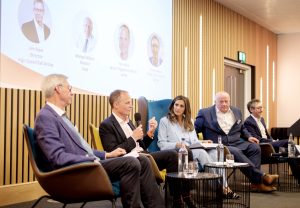
Jim Steer, HSRG Board, Michael Wilton, Arup Director, Global Civil Engineering Skill Network Leader, Tom Wilne, Senior Programme Director, Jacobs and Russell Jackson, Global Transit Director, AECOM came together to consider the need for pragmatism in delivery: setting out a credible project pipeline and empowering delivery teams to succeed within a stable, long-term framework.

Keynote Address: Mark Wild on the HS2 Reset
Mark Wild, CEO of HS2 Ltd, addressed the conference with a frank assessment of the project’s challenges and the major reset now underway. He noted that over 34,000 people are currently working in the HS2 supply chain, reflecting the enormous national effort behind the programme.
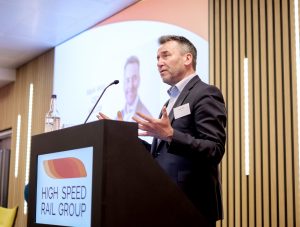
Wild outlined how the reset will shift HS2 into a more logically sequenced delivery model, correcting early issues such as insufficient design maturity and an imbalance of risk between client and contractor. He thanked the High Speed Rail Group for its consistent support throughout the reset process, describing the coming phase as an opportunity to build stronger foundations for the next stage of delivery.
Panel session: Unlocking Productivity and Investment Through Rail
In a powerful discussion led by Vernon Everitt, Transport Commissioner for Greater Manchester, Amanda White, Rail Portfolio Lead, Jacobs and Paul Hirst, Chair, Northern Powerhouse Partnership Transport Committee, the panel explored how infrastructure, policy, and innovation can work together to drive productivity and secure sustained investment across the UK. Topics included:
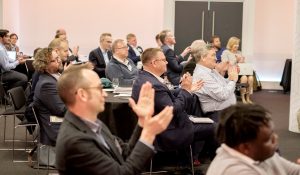
- The need to address the productivity gap in the North through better, faster connections.
- Aligning national and local policy over the long lifespans of megaprojects.
- Building coalitions of leaders with “skin in the game” to guide long-term change.
- Packaging projects for investment, making the benefits and returns tangible for funders.
- The role of devolution in creating a convergence of interests between central government, local authorities, and the private sector.
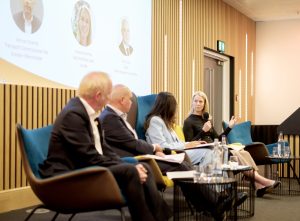
The panel made the case that transport infrastructure must be seen not as a capital cost, but as a core driver of economic transformation.
A Strong Call from the Next Generation
A powerful contribution came from apprentices working across the sector, who urged leaders to take the skills challenge seriously. If the UK wants to deliver green, world-class infrastructure, we must build a visible, supported, and ambitious talent pipeline to match.
Chaired by Natalie Penrose, Director of Stakeholders, Skills and Inclusion, HS2 Ltd and with Matthew Lewis, Rail Engineering Apprentice, Hitachi Rail, Evie Bracher, Project Management Degree Apprentice, Alstom and Megan McCreadie, Project Management Degree Apprentice, AtkinsRealis, panelists explored the need for:
- A clear, consistent pipeline of work across the rail and infrastructure sector.
- Greater visibility of rail as an exciting and future-proof career.
- Ongoing investment in people, not just projects.

The message was simple: if we want to build the future, we need to invest in those who will build it.
Conclusion: From Vision to Delivery
From policy to people, and from delivery models to devolution, this year’s HSRG Conference reinforced the importance of realism, readiness, and relentless focus on outcomes.
As the UK faces major decisions about infrastructure and investment, high-speed rail remains a powerful tool, not just for connecting places, but for unlocking opportunity, productivity, and inclusive growth. The High Speed Rail Group stands ready to support the government and partners to deliver it.